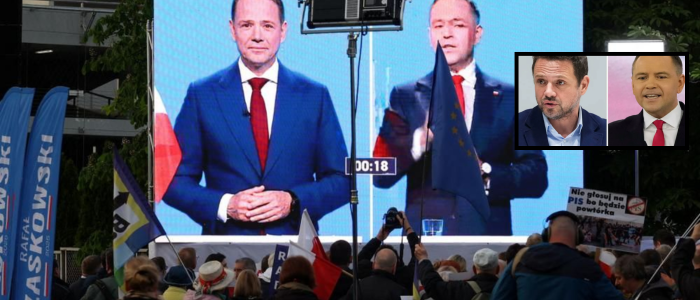Though the Polish presidency is mostly a ceremonial position, it has the right to veto laws and can impede government reform. The current Donald Tusk led ruling coalition would not be able to muster a majority to overturn the Presidents veto.
The current conservative president, Andrzej Duda, who had a heavy use of his veto, cannot run again. What would be his likely right-wing successor, Karol Nawrocki, has promised to keep on fighting Tusk's liberalism — legalizing abortion up to 12 weeks, as was the case in communist Poland, and judicial reform.
Profiles and Supporters of the Candidates
The man, Karol Nawrocki, 42, leads the Institute of National Remembrance, a state-run organization that is responsible for investigating historical crimes. He previously directed the Museum of the Second World War in Gdansk, where he edited exhibits to emphasize Polish heroism. He is widely regarded as a firm believer in Catholic values, farmers and the sceptics of EU environmental rules.
Nawrocki has a 'tough guy' public image and has advertised himself with workout photos, having once even been described as the "Polish Captain America" by former PM Mateusz Morawiecki. While he acknowledged a colorful history of boisterous hooligan brawls, he denied far graver allegations of gang ties and underhanded property deals, dismissing them as media inventions.
Controversy aside, Nawrocki enjoys significant support among older, conservative, rural voters who view him as a protector of national interests.
Rafal Trzaskowski, 53, is a multilingual liberal and deputy leader of the Civic Platform party. He is a former Europe Minister adored by younger, educated urban voters who back LGBT rights, women's rights, and a closer EU relationship.
He is supported by those who consider him intelligent and professional, while his detractors, portraying him as a member of Poland's urban elite, level such criticisms. Nudging squarely into this ground was Trzaskowski's appearance at a march the previous Sunday, with Romania's new liberal president promoting the unity of all of Europe.
Key Voting Groups and Stakes on the Campaign Trail
The second-round runoff will be largely a function of which candidate can best turn out his base and bring in voters from two far-right candidates who placed third and fourth in opening-round voting. These candidates did three times as well as they had in 2020, reflecting an increase in anti-establishment feelings.
Though many on the far-right have supported Nawrocki for his conservative views, certain libertarians did not like that he supported welfare programs.
At rival demonstrations in Warsaw this past weekend, supporters of Nawrocki were waving Polish flags and rejecting the EU, being countered by supporters of Trzaskowski waving the European Union's flag. Magdalena, the voter, said, "First family, then the country…. I don't care what the Germans think."
With stakes high, both sides view this election as a turning point for the direction of Poland's politics, particularly where it relates to E.U. cooperation, judicial overhaul and national identity.
















